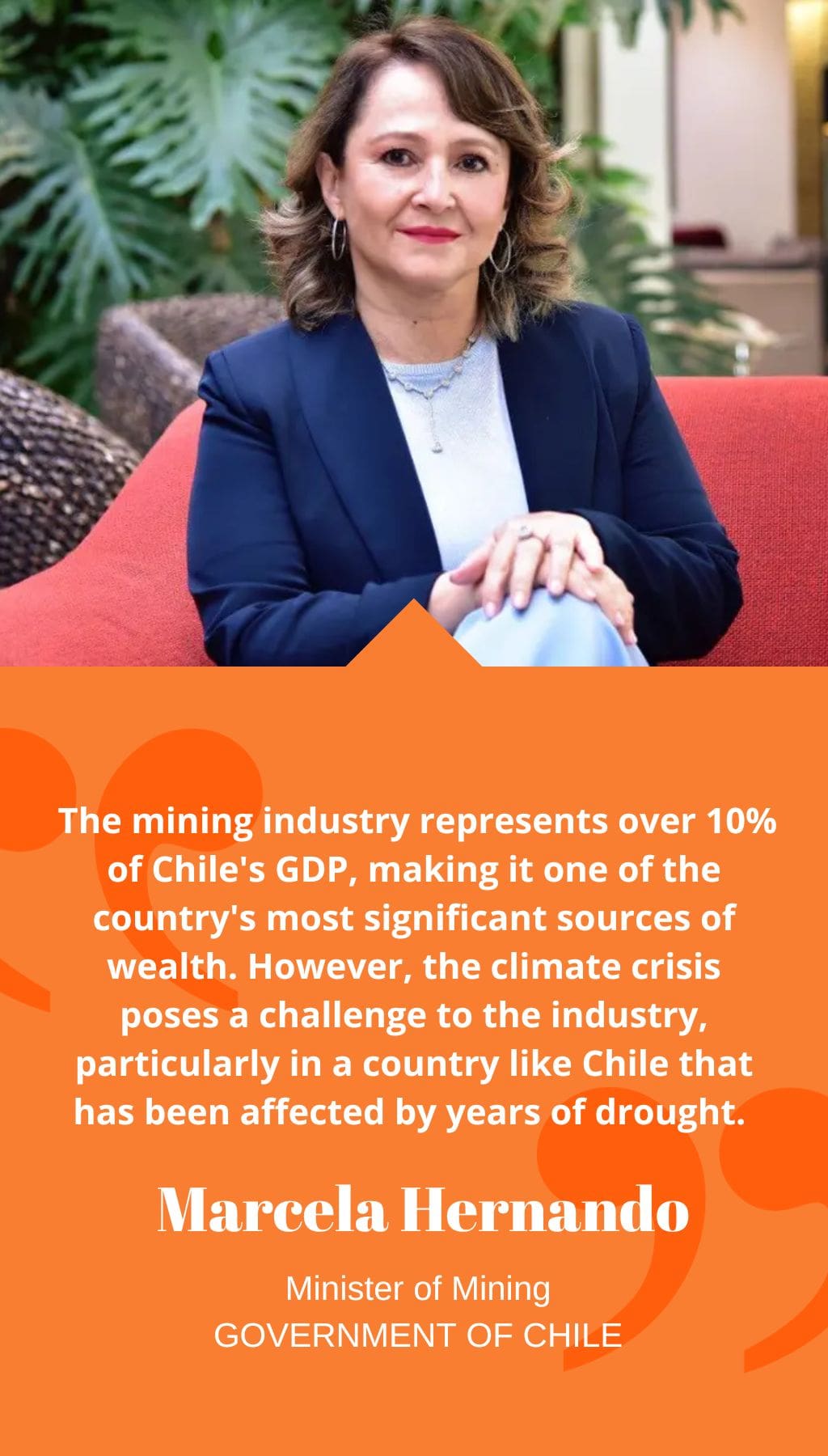
- Chile | 12 February 2022

Could you discuss the vision of the Boric government regarding the Chilean mining industry?
The mining industry represents over 10% of Chile’s GDP, making it one of the country’s most significant sources of wealth. However, the climate crisis poses a challenge to the industry, particularly in a country like Chile that has been affected by years of drought. The government is committed to ensuring that the mining industry operates sustainably and responsibly to address these challenges. This includes advancing towards decarbonization, tracking and monitoring emissions, and formalizing commitments to renewable energy. Chile has already made significant investments in renewable energy since 2014, and the government believes that seawater can play a vital role in mining as a way to address the water scarcity issue. Additionally, circular initiatives to maximize the reuse of water and addressing the issue of mining waste and environmental liabilities are also priorities.
What is the potential for further exploration and discoveries of large deposits, and how can junior companies increase their participation?
The government views the current investment in exploration in Chile as insufficient, particularly as most projects focus on brownfield initiatives to extend existing operations. The government aims to increase legal certainty for those willing to invest in exploration through regulatory changes that will open doors for new developments. In terms of increasing the participation of junior companies, the government believes that ENAMI, a state-owned company, has a significant role to play, not just in metals but also non-metallic minerals.
How could tax and constitutional reforms impact the attractiveness of Chile for investment?
While the fiscal framework is a crucial factor for investors, it is not the only one. The government acknowledges that political stability and social peace are equally important. Chile has shown its ability to reach understanding and resolve conflicts via dialogue, as seen in the intense social protests of 2019. The government is committed to making Chile a fairer country in terms of the relationship between industries and the population. From the perspective of companies, changes to the tax regime can be seen as an investment towards social stability and security for their businesses in the long run.
Could you provide more details about the government’s plans for the lithium mining sector in Chile?
As you may know, Chile is a major player in the lithium mining industry, currently the second largest producer of lithium in the world. However, we mainly produce lithium carbonate, and we want to expand into producing lithium metal and lithium for batteries. To that end, President Boric’s government is committed to creating a state-owned lithium industry, which could take various forms, such as a state-owned company or a public-private partnership. We want to ensure that the development of the lithium mining sector in Chile is sustainable, responsible, and beneficial for all Chileans.
How can environmental liabilities like tailings dams be transformed into assets that can be remediated through profitable metal extraction?
The challenge of environmental liabilities, such as tailings dams, is a critical one. However, I have always been impressed by the creativity and innovation of Chilean engineers who have developed technologies to tackle the challenges of a constantly evolving industry, such as mineral grade deterioration, energy costs, and water supply. Today, we have ways to process materials that were once considered waste. Tailings, for example, contain great wealth, so there is an opportunity to profitably remediate these environmental liabilities. One excellent example of this is the Minera Valle Central in Rancagua, which has successfully reprocessed these deposits. We have identified these liabilities and intend to stimulate public and private investment in this area, as we believe that it will have significant economic and environmental benefits.
What is the government doing to promote the sustainable use of water sources, and how are mining companies incorporating new technologies in this segment?
We have formed an interministerial committee to address the issue of water scarcity, and one of our first agreements is to build shared infrastructure. The quickest solution to water scarcity is to install desalination plants, but we recognize that desalination also has environmental impacts, and therefore we must ensure that these facilities can support not only mining companies but also the agricultural segment and the general population. In the longer term, we aim to have an interconnected water system to achieve an efficient distribution of this resource throughout the country. In terms of mining companies, many are incorporating new technologies to optimize water use and minimize waste, such as recycling water in their processes and using sensors to monitor water use. The government is also committed to working with these companies to develop new and innovative solutions to promote the sustainable use of water sources.














